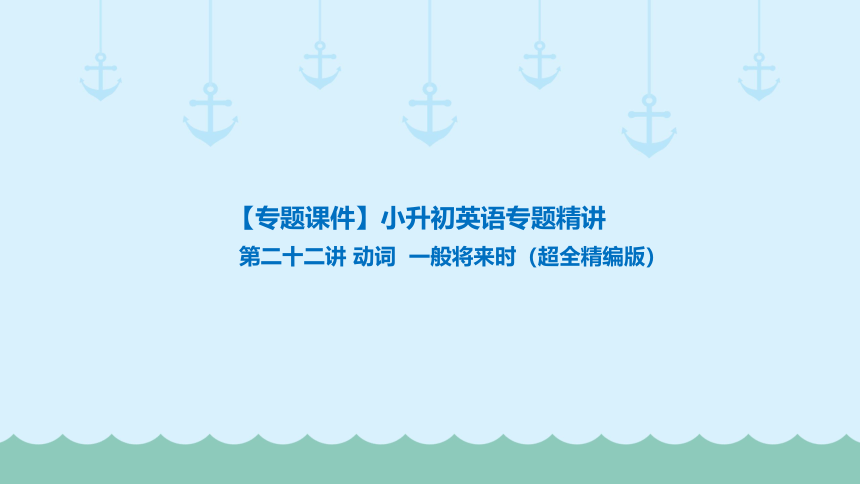
【专题课件】小升初英语专题精讲 第二十二讲 动词 一般将来时(超全精编版) Language points 一、一般将来时的概念及作用: 1.一般将来时表示将要发生的动作或情况。例如: 我明天将和我的表弟去游冰。 I will go swimming with my cousin tomorrow. Language points 一、一般将来时的概念及作用: 1.一般将来时表示将要发生的动作或情况。例如例如: 他们下周将举行场运动会。 They will have a sports meet next week. Language points 一、一般将来时的概念及作用: 2.有些动词,如come, go, leave等,也可用现在进行时表示将来。例如: 公共汽车就要来。 The bus is coming. Language points 一、一般将来时的概念及作用: 2.有些动词,如come, go, leave等,也可用现在进行时表示将来。例如: 我们明天就去那儿。 We are going there tomorrow. Language points 布菜克先生下周要离开香港。 Mr Black is leaving Hong Kong next week. 一、一般将来时的概念及作用: 2.有些动词,如come, go, leave等,也可用现在进行时表示将来。例如: Language points 一、一般将来时的概念及作用: 3.一般将来时句中一般有以下时间状语: tomorrow,next day/week/month/ year/...,soon,the day after tomorrow等。例如: 明年这儿将有一家大型工厂。 There will be a large factory here next year. Language points 二、一般将来时的构成 一般将来时的基本结构是: 1.由"be going to +动词原形"构成。例如: 我打算明天去钓鱼。 I am going to go fishing tomorrow. Language points 二、一般将来时的构成 一般将来时的基本结构是: 2.由"will/shall +动词原形"构成。例如: 我们这个周未将去游泳。 We will/shall go swimming this weekend. Language points 三、一般将来时的句型转换 1.否定句:在be动词(am,is, are)后加not或will/shall后加not构成won't/shan't。例如: 我打算明天去滑冰。 l am going to go skating tomorrow. →l am not going to go skating tomorrow. 我不打算明天去滑冰。 Language points 三、一般将来时的句型转换 1.否定句:在be动词(am,is, are)后加not或will/shall后加not构成won't/shan't。例如: 我明天将去购物。 l will go shopping tomorrow. 我明天将不去购物。 →l will not go shopping tomorrow. Language points 三、一般将来时的句型转换 2.一般疑问句:将 be动词或will/shall 提到句首,some改为any, and改为or,第一、第二人称互换。例如: 他们打算下周去摘些橙子。 They are going to pick some oranges next week. 他们打算下周去摘些橙子吗? →Are they going to pick any oranges next week? Language points 三、一般将来时的句型转换 2.一般疑问句:将 be动词或will/shall 提到句首,some改为any, and改为or,第一、第二人称互换。例如: 我明天将参观颐和园。 I will visit the Summer Palace tomorrow. 你明天将参观颐和园吗? →Will you visit the Summer Palace tomorrow? Language points 三、一般将来时的句型转换 3.特殊疑问句:由“疑问词+一般疑问句”构成。例如: 汤姆将去上学。 Tom will go to school. 谁将去上学? →Who will go to school? Language points My father is going to watch a race with me this afernoon. 你父亲打算今天下午和你去干什么? →What is your father going to do with you this aferoon? 三、一般将来时的句型转换 3.特殊疑问句:由“疑问词+一般疑问句”构成。例如: 我父亲打算今天下午和我去看比赛。 Improve 1. shall用于第一人称,will用于第二、三人称。例如: 我将为聚会买些花。 I shall buy some flowers for the party. 你将和我们一起去吗? Will you go wit ... ...
~~ 您好,已阅读到文档的结尾了 ~~

